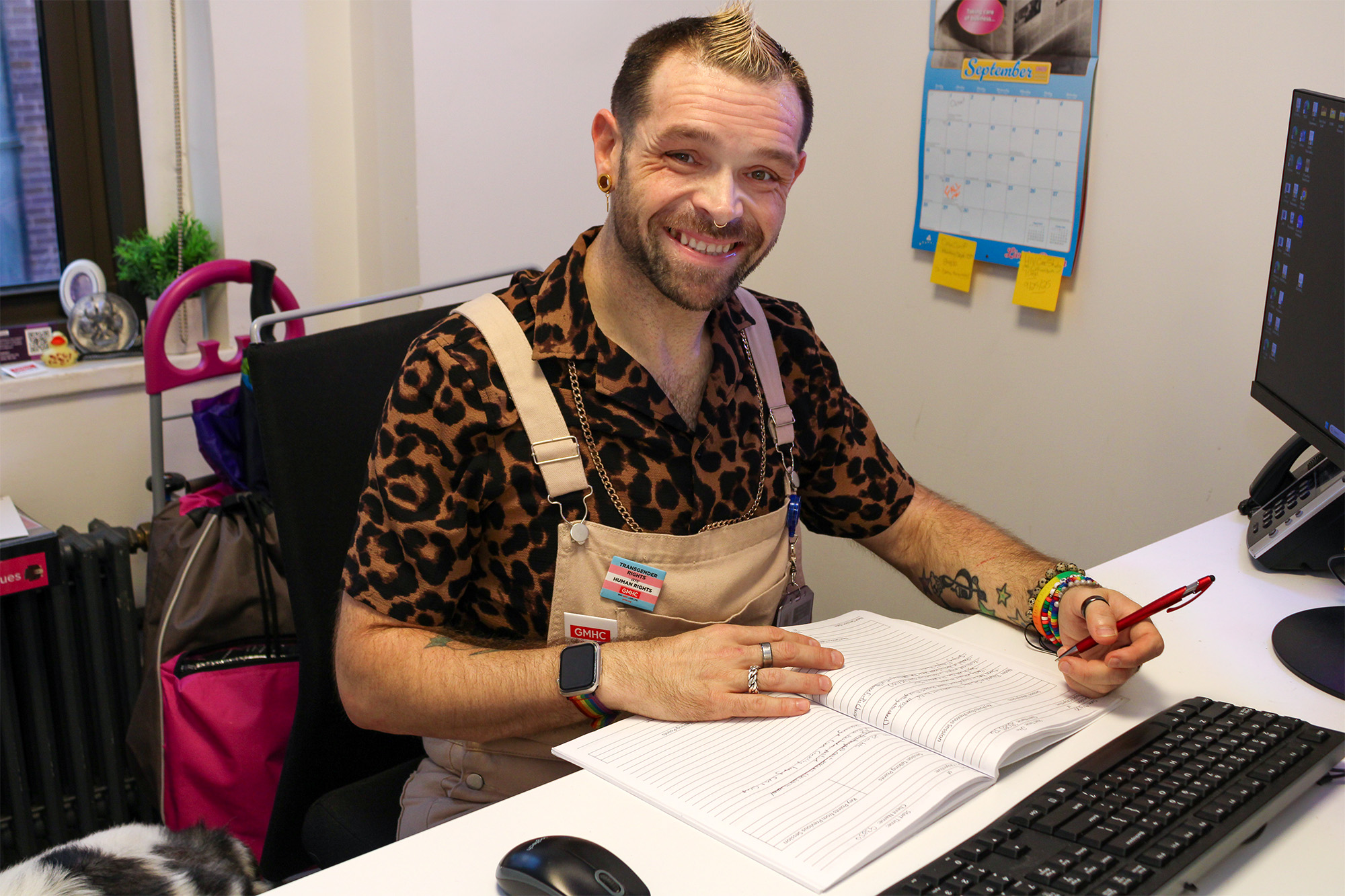Enrollment has more than tripled since GMHC began offering person-centered substance use services last year to New Yorkers wanting help with substance use, thanks to a five-year grant from the federal Substance Abuse and Mental Health Services Administration (SAMHSA) and three-year funding from Elevance Health.
The program is serving over 70 clients now, mostly low-income New Yorkers from Black and Latinx communities who don’t have access or the means to receive substance use services, said Baron Nelson, Program Coordinator for Substance Use Services. “Our focus is people of color because of the need, but anybody over 18 who walks through our doors with a history of substance use is eligible,” he said. Substances can range from crystal meth to opioids, heroin, and alcohol.
Through substance-use education, the our team empowers clients to avert crises. That includes training on using Narcan kits and fentanyl test strips to prevent overdoses.
Substance use also can play a role in transmitting HIV, STIs and viral hepatitis, through sharing needles or reducing inhibitions around risky sex. “We talk to our clients about HIV all the time. We provide a lot of education on healthy sex practices and safer drug usage,” Nelson said.
Many clients come from communities of color heavily impacted by HIV in New York City, where Black and Latinx people together make up 83% of new HIV diagnoses, according to the NYC Department of Health and Mental Hygiene. Joining GMHC for person-centered substance use opens the door to HIV and Hepatitis-C testing, as well as linkage to PrEP (pre-exposure prophylaxis) for HIV-prevention, Nelson said. For clients living with HIV, it can facilitate maintaining or re-engaging with HIV care.
“The bigger picture is that people are coming in with overlapping mental health and psychosocial challenges, such as housing and food insecurity,” he said. “Many clients who use substances have a history of trauma, stigma, and loss, particularly for LGBTQ+ and communities of color. It’s all interconnected. So how do we untangle all of this through counseling, person-centered services, and psychosocial support, so that clients can eventually become stable?”
More often than not, a client is treated like a number at the NYC Human Resources Administration or a treatment facility, so our counselors focus on creating safe spaces where clients can feel heard and respected.
BARON NELSON
How It Works
Along with safer substance-use education, the SAMHSA grant supports individual and group counseling from our Credentialed Alcoholism and Substance Abuse Counselors (CASACs), Zack Reedy and Colby Walsh, while our case manager, Dale Nelson, can link clients to other GMHC services, such as housing, food, access to health insurance, or job training. Medication-assisted treatment (MAT) is also available to reduce cravings.
“More often than not, a client is treated like a number at the NYC Human Resources Administration or a treatment facility, so our counselors focus on creating safe spaces where clients can feel heard and respected,” Nelson said. “That can be something as simple as giving clients choices and respecting their boundaries. All of that builds trust in a healing space.”
Clients choose what services to receive and determine their own goals, whether it’s using drugs more safely or achieving abstinence. “We want to respect their autonomy, and let them set the pace,” Nelson said.
For instance, individual counseling sessions are generally weekly, but clients can also choose biweekly sessions. They can also decide whether to attend in person or virtually. “A lot of our clients are transient, so it might be hard for them to come in,” he explained. “Some of our clients don’t like to go outside, because they have a fear of being in public.”
“It’s about building trust instead of judgment,” Nelson said. “We meet people where they are at and see if we can help them not to use.”
To do that, CASAC counselors help clients identify substance-use triggers and find better ways to manage cravings. For instance, if a client in an individual or group counseling session mentions going by a spot where there’s heavy drug use, Walsh or Reedy might ask for more insight about the target customers and when drug dealers come by. From there, they could ask the client what the person dealing drugs says to them, then do a role-playing re-enactment on how to have the conversation in a safe way. “We want to help clients deflect those triggers,” Nelson said.
Walsh facilitates a group for crystal meth users on Fridays, while Reedy has started a group called Velvet Rage on Wednesdays for people to talk about past or current substance use. The group takes its name from a self-help book for gay men about overcoming stigma and internalized shame to blossom as their authentic selves. “It’s very interactive. People love it,” Nelson said.
“Whether it’s addressing substance-use triggers, or food and housing needs, people can come to GMHC and feel supported,” he said. “There is no stigma around substance use here. We want to support our clients on their terms and get them to where they want to be.”
Stay in the Know
Sign up to receive our monthly newsletter, updates about events, and other helpful information.

